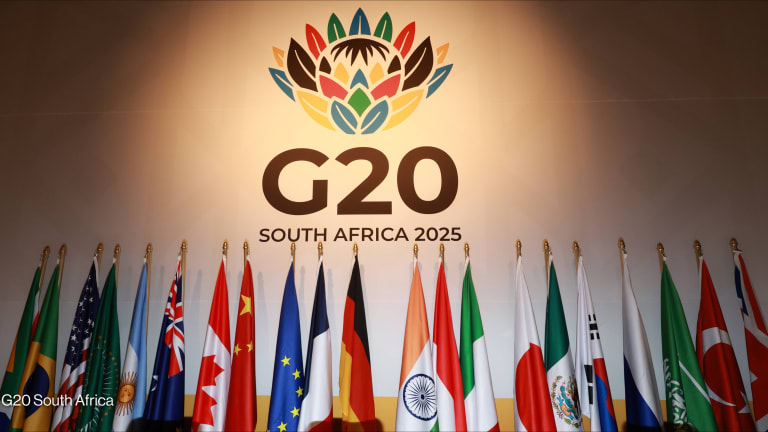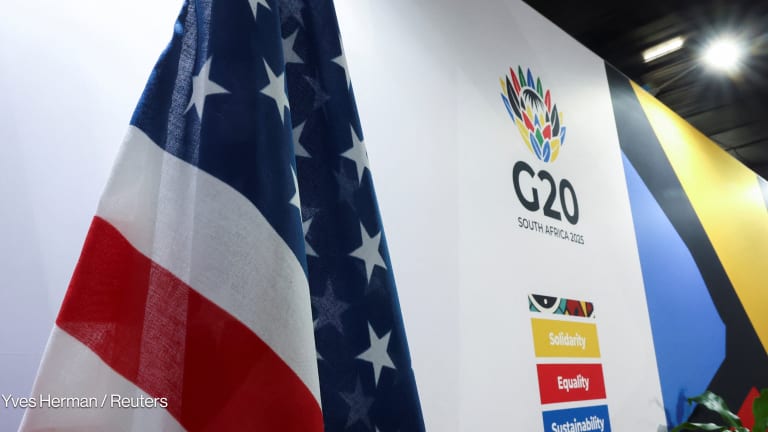Did the G20 move the needle on debt?
“The elephant is on the move,” said Laura Kelly of the IIED. “But the elephant needs to move further and faster.”
Today, 3.3 billion people are living in countries that spend more on their debt interest payments than they do on education or health. It’s something that throughout the last year, the Group of 20 largest economies has been trying to address — and an issue that was particularly pushed by Brazil, which held the group’s presidency. But as the G20 Summit came to a close this week, most experts felt the lack of decisive action on debt weighed nearly as heavy as the debt itself. “As ambitious as the Brazilian presidency has been, the lack of implementation of that progress — right now, in the midst of a global crisis — is absolutely horrifying,” said Eric LeCompte, the executive director of nonprofit Jubilee USA Network. “The majority of the world’s countries are facing debt crises, and we have the major decision-makers of the world, the G20, not being able to make decisions.” The G20 Summit came at a time when global public debt has reached record heights. In 2023, the world was $97 trillion in debt, and 54 low- and middle-income governments were spending at least 10% of their revenues on their interest payments, according to the latest figures from the United Nations Trade and Development organization. On top of that, the world’s lowest-income and most climate-vulnerable countries have debt repayments that are twice what they receive in climate finance, a mismatch further reducing countries’ ability to withstand climate shocks. “Unless world leaders from these wealthy countries start to wake up, we’re not only going to be dealing with challenges in the developing world,” said LeCompte. “We’re going to be dealing with significant challenges that will come back to the developed world, too.” Four years ago, the G20 established the Common Framework to help low-income countries restructure their mounting debt. But throughout that time, it’s been criticized for its lack of effectiveness and impact. It took Zambia, for example, nearly four years to restructure its debt under the framework, with disagreements between creditors and geopolitical tensions slowing the progress. Since then, the debt restructuring process has become faster — it took half the time to restructure Ghana’s debt than it did Chad and Zambia, the International Monetary Fund has stated, and the IMF expects Ethiopia’s debt restructuring to be faster still. Despite that, there is still widespread recognition that more needs to be done to improve the process. In the G20 Leaders’ Declaration, the formal statement released at every summit that outlines the agreements made during deliberations, leaders emphasized the importance of addressing debt, and promised they would be “stepping up the Common Framework’s implementation in a predictable, timely, orderly and coordinated manner.” They also emphasized their support for the Global Sovereign Debt Roundtable, which brings creditors and debtors to tackle disagreements. And though the G20 discussed improving the Common Framework throughout the year, ultimately, nothing really changed, explained Jayati Ghosh, a professor of economics at the University of Massachusetts Amherst. “I’m getting a little tired of statements,” Ghosh told Devex. “There are some immediate and obvious measures that could be taken, but they’re not being taken.” One of those measures, Ghosh said, was implementing a debt standstill: A temporary suspension of debt repayments for both principal and interest. “It makes creditors a little more interested in a speedy resolution,” she said. “That’s such an obvious thing, and it hasn’t been done.” Ghosh has also been pushing for countries in debt to create a coalition, one that would add a louder, more unified voice to debtor-creditor negotiations. There’s also the interplay of debt and climate, and the fact that many experts wished G20 leaders would have pressed for more concessional loans or public grants to help countries combat climate change — especially for those who haven’t contributed to the problem. Instead, most of the conversations revolved around private finance, investments, and loans, explained Ilan Zugman, the Latin America managing director at environmental organization 350.org. “It’s like someone burned your house, and then you’re offering that person a loan to build a new one,” Zugman told Devex. “The hope was that the G20 could help to unlock some of this finance through the Leaders’ Declaration, but what is in there is not super helpful.” Despite that, it wasn’t all bad news. World leaders agreed on the need to tax the world’s richest, a population that today, is taxed at rates between 0% and 0.6%, according to research commissioned by the G20. In theory, such a tax could boost money for global issues, and be channeled into climate financing, debt relief, and other areas. They also explored approaches such as pause clauses, which can allow a country to temporarily suspend debt repayments in the wake of a natural disaster, and debt for nature swaps, where a portion of a developing nation’s foreign debt is forgiven in exchange for local investments in environmental conservation measures. While Laura Kelly, a director at the London-based research organization the International Institute for Environment and Development, had also hoped for more action on debt, she still acknowledged that Brazil’s G20 presidency had laid important groundwork — and raised awareness of the fact that the status quo isn’t working. “The elephant is on the move,” Kelly said. “But the elephant needs to move further and faster.”
Today, 3.3 billion people are living in countries that spend more on their debt interest payments than they do on education or health.
It’s something that throughout the last year, the Group of 20 largest economies has been trying to address — and an issue that was particularly pushed by Brazil, which held the group’s presidency. But as the G20 Summit came to a close this week, most experts felt the lack of decisive action on debt weighed nearly as heavy as the debt itself.
“As ambitious as the Brazilian presidency has been, the lack of implementation of that progress — right now, in the midst of a global crisis — is absolutely horrifying,” said Eric LeCompte, the executive director of nonprofit Jubilee USA Network. “The majority of the world’s countries are facing debt crises, and we have the major decision-makers of the world, the G20, not being able to make decisions.”
This story is forDevex Promembers
Unlock this story now with a 15-day free trial of Devex Pro.
With a Devex Pro subscription you'll get access to deeper analysis and exclusive insights from our reporters and analysts.
Start my free trialRequest a group subscription Printing articles to share with others is a breach of our terms and conditions and copyright policy. Please use the sharing options on the left side of the article. Devex Pro members may share up to 10 articles per month using the Pro share tool ( ).
Elissa Miolene reports on USAID and the U.S. government at Devex. She previously covered education at The San Jose Mercury News, and has written for outlets like The Wall Street Journal, San Francisco Chronicle, Washingtonian magazine, among others. Before shifting to journalism, Elissa led communications for humanitarian agencies in the United States, East Africa, and South Asia.








